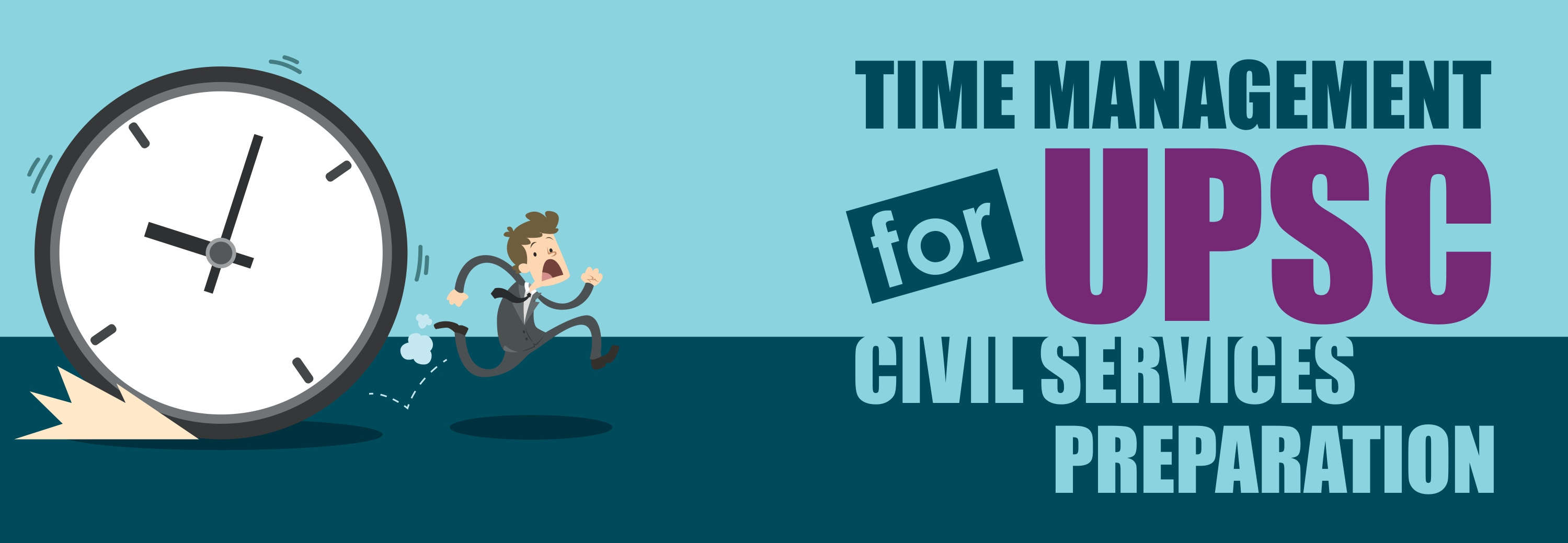If you are preparing to take the UPSC civil services prelims and hoping to take the mains that will follow, the million dollar question on your minds is bound to be – how do I manage my time effectively for the civil services exams study? Cracking the UPSC exams require among other things the ability to cover comprehensively a lot of topics in a rather limited amount of time.
It can be intimidating trying to figure out how to study the UPSC syllabus. Now it doesn’t require super-human powers to be able to do it. You just need to follow some techniques that have been tested by achievers in the past. In this article, we discuss the importance of time management skills in your IAS preparation and also a few useful tips for you to incorporate.

Why should you learn to manage your time?
Time management is essentially utilising all your time to the maximum benefit. There are techniques which help you squeeze out the most out of your time. The principle of Scientific Management propounded by the great Frederick Taylor suggests that by doing things in a certain way, the efficiency can be increased. This can be applied while studying for the UPSC civil services too. An aimless study will render learning ineffective and at the end of the day, you will wonder ‘where did all that time go?’
- Time management greatly increases your productivity and efficiency.
- It is the only way to cover the vast UPSC syllabus.
- Better time management means you would be less stressed, thus making your IAS preparation more comfortable and productive.
Prerequisite for time management
According to academic leader Neil Shipman, the foremost quality needed to be able to manage time well is that you should be aware of yourself. You should know your habits and ‘your ways of working.’
Useful tips for better time management for civil services preparation
Have a routine
It is important to chart out a time schedule before you start your UPSC exam study. Have a daily planner as well as a monthly calendar wherein you divide your portions. Your daily planner should include your daily regimen. Start your day early. If you are not used to waking up early, build that habit with an alarm clock. Of course, if you switch off your alarm clock and go back to sleep, you might as well forget about that IAS dream of yours. This goal is not for procrastinators. Allot a specific time for all your activities and do not linger around more for any one activity.
Break time
Of course, you must take short breaks in between and make sure you allot time for that too. This will help you rejuvenate. But remember, a ten-minute walk in your terrace or a five-minute cup of tea should not extend into half hour breaks. Do not give in to these temptations. Being a stickler for time can be the difference between winners and losers.
Beware of timewasters
Timewasters are essentially those activities or people that use your time and give you no benefit at all. It could be unnecessary chain emails or messages. It could be your friend too who chats about practically nothing on your phone for thirty minutes. It could also be a topic that you have to cover and you spend more time than what is necessary on it. Learn when to stop. There is no point in going over something again and again. When you do it once, do it effectively. Learn to say ‘NO’ to these timewasters. You cannot blame them if you fail in achieving your dream civil services profession.
Do not disturb
If it helps, place a ‘Do not disturb’ sign on your door when you study. This will prevent others from accessing your ‘study time’ thus enabling you to turn up your productivity. Go out only during your breaks or if it is an emergency. And no, the last over of a cricket match is not an emergency!
Fix time for electronic media
Sure you can check your emails and WhatsApp but do it in the allotted time. This helps you to avoid wasting time. Also, you can focus more on your studies by letting go of such distractions. Also convince yourself that you don’t have to respond to every forward that comes on social media. Ask yourself, ‘will my “like” to this post help me achieve my civil services dream?’ The answer to that question should discourage you from frivolous social media activities.
By incorporating these smart tips in your UPSC civil services preparation you can manage your most precious resource i.e. time effectively and optimally thereby helping you cover the UPSC syllabus and also gain confidence. Remember there are two kinds of time – clock time and real time. Clock time is the same for everyone. But real time is relative. With good time management skills, an ideal UPSC aspirant can cover in half a day what someone else can cover in three days. Even five minutes can prove decisive when it comes to cracking one of the toughest competitive exams in the country – the UPSC civil services. So, schedule, organise and work steadfastly, and watch your dreams come true.
Also Read | ‘Top Ten Toppers’ Tips to Crack the UPSC Exams
The links given in the table below will be crucial for your IAS Exam preparation.
Related Links
Comments